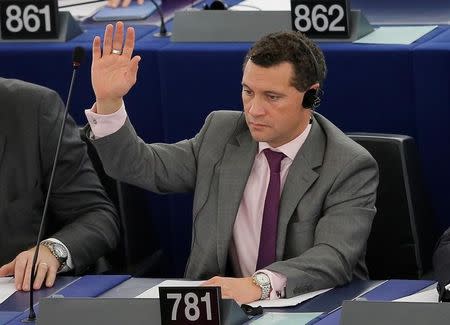Brexit campaigners gear up for fight back to stop betrayal

By Elizabeth Piper
LONDON (Reuters) - Brexit supporters are gearing up for a fightback against "ultra-Remainers" to ensure the result of Britain's referendum on leaving the European Union is fully respected, a prominent campaigner said on Wednesday.
Steven Woolfe, a member of the European Parliament and former leadership hopeful for the UK Independence Party (UKIP), said on Wednesday he was coordinating Brexit groups to challenge what he called the Remain campaign's "rearguard action" to weaken Britain's hand and secure a divorce in name only.
After winning the June 2016 referendum, many Brexit or Leave campaigners feel they are losing ground to voices questioning the meaning of the vote, a debate which has deepened divisions and prompted some to predict a "Brexit betrayal".
"The Leavers are having a fightback," Woolfe told Reuters in an interview.
Woolfe was not a leading light in the Brexit campaign, dominated by Boris Johnson, who went on to become foreign minister, and former UKIP leader Nigel Farage.
But after becoming concerned over Brexit, Woolfe said he had stepped into the role of engaging other groups in the search for a united message against those campaigning for continued EU ties, who he said were better funded and organised.
"After the referendum the Brexit movement left the pitch ... What they didn't anticipate was the virulent and strident Remain, and some call it ultra-Remain, reaction to Brexit."
This time, instead of sending people out onto the streets, Woolfe said the groups would produce policy papers detailing their vision for the future relationship with the EU, including on immigration and financial services.
"ONE VOICE"
"We will talk with one voice," he said. "We have something that is mission critical, the next six weeks ... is really the time when most of the decisions will be made on our trade future."
The referendum, in which 52 percent voted to leave the EU and 48 percent to remain, exposed deep geographic, social and economic divisions in Britain.
While England and Wales voted to leave, Scotland and Northern Ireland backed remain. Many cities, including London, voted to remain, while voters supported Brexit in northern England, where many have been hurt by the demise of the coal and steel industries, and in coastal towns and villages.
For some of those who backed Brexit, talk of overturning the 2016 vote, holding a second referendum or even the Conservative government's agreement to having a two-year transition period with the EU in which little changes, amounts to a betrayal.
To turn the tide, Woolfe and his supporters want to press what he calls his four freedoms - of Britain having control over all its laws, its finances, trade agreements and immigration.
"If the final deal has a conclusion that means that those four key points are not in the control of the UK government ... it is an absolute betrayal of the people who voted to leave the European Union," he said.
(Reporting by Elizabeth Piper; Editing by Gareth Jones)

